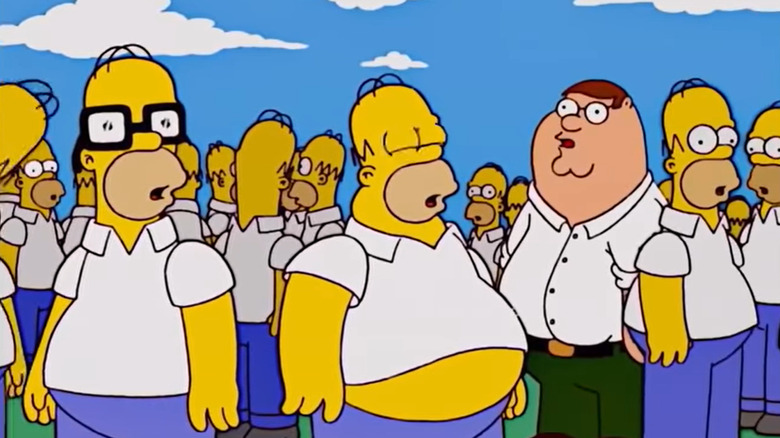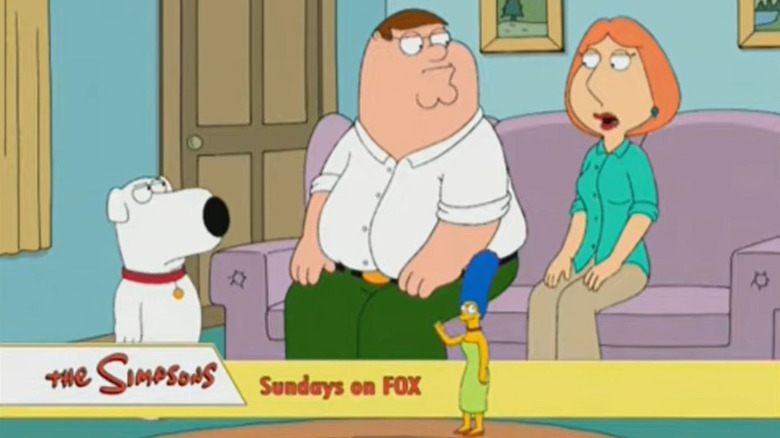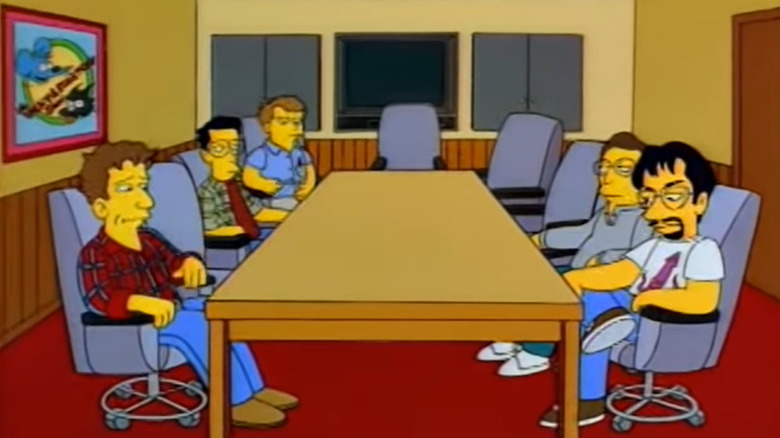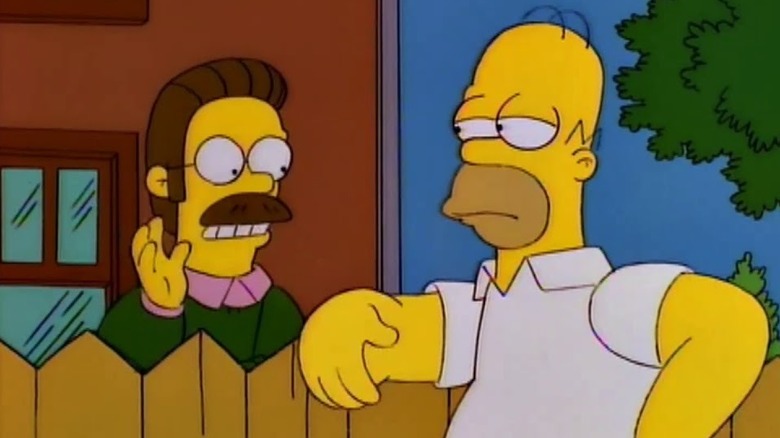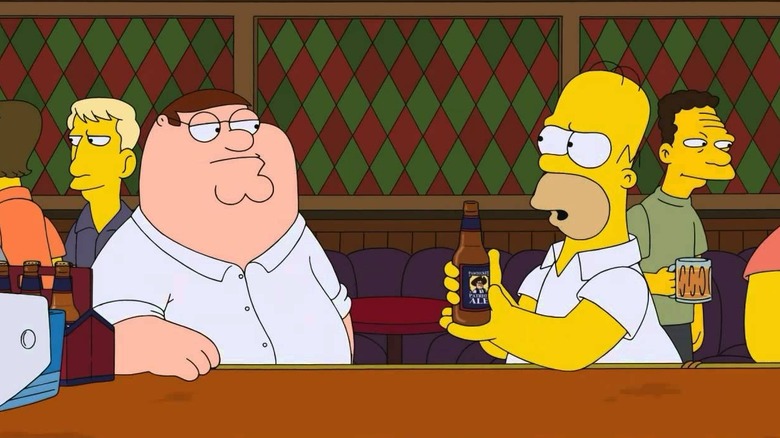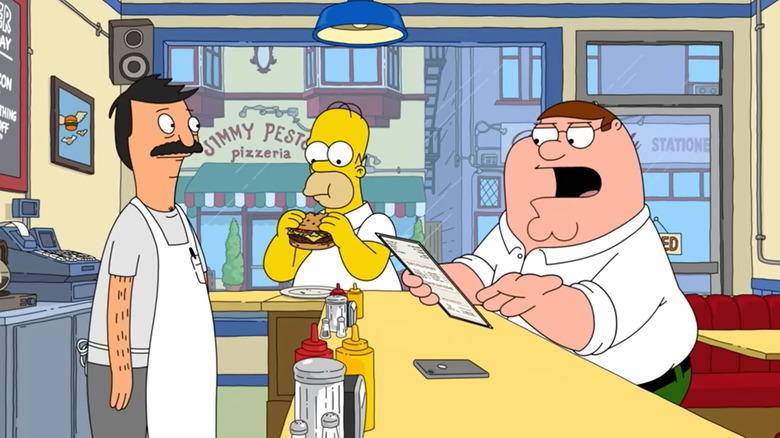What Longtime Simpsons Writers Really Think About Family Guy
Warning: This post contains mentions of sexual assault.
As the golden era of "The Simpsons" started to die down in the late '90s, a bunch of other adult animated sitcoms rose to prominence, all vying for the cultural power Matt Groening's series once had. From "Futurama" to "King of the Hill" to "South Park," there was no shortage of shows that put their own spin on "The Simpsons" formula, and many of them are still going strong even today. But whereas the "South Park" writers stayed pretty respectful towards "The Simpsons," acknowledging explicitly in their 2006 "Cartoon Wars" special that the older show is far classier and more prestigious than their own, the writers of another prominent raunchy cartoon aimed for far more of a rivalry.
"Family Guy," with its familiar premise of an oafish father trying and failing to do right by his long-suffering wife and his three children, immediately garnered criticism for being a lazier, edgier version of "The Simpsons." Although there was plenty about "Family Guy" that felt original and inspired — mainly, the evil gay baby and the talking liberal dog — the show clearly wouldn't have existed without "The Simpsons" before it. The fact that it seemed to be trying to take the older show's mantle didn't ease tensions much either.
In the "Simpsons vs. Family Guy" wars, however, it was technically the "Simpsons" writers who threw the first stone. The 2002 episode "Treehouse of Horror XXIII" showed us a crowd of Homer clones, one of which was Peter Griffin. In the 2005 episode "The Italian Bob," there was a gag where the Italian police leafed through a handy book of American crimes. The first page read "Invasione di Casa," showing Snake, the second page read "Drink-o Drive-o," showing Mayor Quimby, and the third one read "Plagiarismo," showing none other than Peter Griffin.
So, how did Family Guy respond? Poorly
"Family Guy" threw in their own jabs at "The Simpsons" over the years, but none drew quite as much attention as one joke in the September 2007 episode "Movin' Out (Brian's Song)." In the scene where Brian and Lois are having a surprisingly serious discussion about his relationship with his new girlfriend, at the bottom of the screen appears a bumper for "The Simpsons," with a miniature Marge waving to the audience. Because both shows air on Fox, this could've easily been mistaken for a genuine promo at the time, if not for the slightly uncanny, fish-eyed expression on Marge's face.
Then things get weird: as Brian and Lois keep talking, a miniature Quagmire runs over and attempts to assault Marge. She fights him off and runs off-screen, but Quagmire, pants around his ankles, chases after her with a grin. A few moments later Marge and Quagmire return on screen. "See, that wasn't so bad," Quagmire says, and a now-horny Marge invites him back to her place. What follows is a long shot outside the Simpson household, where we can hear Marge and Quagmire having sex in the parents' bedroom. When Homer walks in, it's implied that Quagmire shoots him dead. Then he shoots Marge, then Bart, then Lisa, and after a long pause, even Maggie.
Needless to say, this gag did not go over well. It was decried by fans and critics alike as a weirdly gross, spiteful, unfunny sequence, not to mention a massively disproportionate response to the jokes "The Simpsons" first made at their expense. The network forced "Family Guy" to cut the joke, claiming it felt weirdly personal and inflammatory, although they allowed it to be shown on DVDs and Adult Swim reruns.
The end of the feud
"What happened here was f**king bulls**t," MacFarlane said about the incident on the DVD commentary. "I got a call from the network saying 'you can't do this, you can't do this gag'... I said 'Why not? They've made fun of 'Family Guy' like five times, which they're entitled to do ... why can't we take a little shot at them?'" Although the obvious response might be that this scene feels like quite a bit more than just "a little shot," the network heads instead told MacFarlane they simply wanted to put an end to the feud between the shows, a claim MacFarlane found "suspicious."
The "Family Guy" showrunner considered the joke (which depicts the rape and violent murder of the entire Simpson family) to be just as personal as the "plagiarismo" joke from two years prior and didn't think it was fair for Fox to only put an end to the jokes between the two series when his show hit back. As he said in the DVD commentary, "The reason, I still maintain, is that — and I said this to them — you're afraid of James L. Brooks, who runs 'The Simpsons,' and you're not afraid of us."
It's been seventeen years since that controversy, and it's not clear if MacFarlane ever changed his mind about the issue. Either way, the jokes at each other's expense stopped there. From that point on, the "Simpsons" references in "Family Guy" had a more respectful tone, like when a jury of "Simpsons" characters got Peter sent to prison in season 10, or when a drunken Peter casually admits to stealing "a lot" from "The Simpsons" in season 14. Rather than seeming disrespectful, the punchline of these jokes centered on just how much more respected "The Simpsons" has always been.
Not so hostile behind the scenes
Even as MacFarlane complained about the cutting of his "Simpsons" joke, he acknowledged that he had plenty of respect for the show's writing team. Not only that, but plenty of writers had moved between the two Fox shows. In fact, the current "Family Guy" showrunner, Richard Appel, was also a writer throughout some of the best seasons of "The Simpsons." A rivalry between the two shows could never last for long, because there was simply too much overlap behind the scenes to keep the teams distinct.
As for how the "Simpsons" writers felt about "Family Guy" during their early years? It was a mixed bag. "When 'Family Guy' debuted ten years into 'The Simpsons” run, our younger writers were incensed: 'It's just vulgar!' 'It moves too fast!' 'It's nothing but pop culture references!'" explained "Simpsons" writer Mike Reiss in his 2018 book "Springfield Confidential." "I had to laugh, because these were all things people said about 'The Simpsons' when it began. Maybe that's why I have a soft spot for 'Family Guy': I think of it as 'The Simpsons' after a few beers."
It's a common sentiment. Although "The Simpsons" feels quaint and family-friendly today, back in 1989 it was constantly attracting the ire of concerned parents and religious groups. Even the golden age seasons weren't as universally beloved in their time, with viewers complaining about how random and provocative the show could get. All-time classics like "Marge vs The Monorail" were once divisive because of how immature and scatterbrained they felt to many viewers. In part thanks to "Family Guy," those aspects of "The Simpsons" now feel tamer and more mature. "Family Guy" might've been threatening to overshadow "The Simpsons," but it was also taking all the heat "The Simpsons" used to get.
The Simpsons' Annoying Neighbor
"'Family Guy' creator Seth MacFarlane is like our Ned Flanders," Reiss continued, "No matter how much we berate him, he's always warm and gracious (and the first to admit his debt to our show). Clearly, this is a man who looked at Homer Simpson and said, 'He needs to be bigger and dumber.'"
Granted, it's not clear if Reiss himself had seen the Marge/Quagmire cutaway before writing this, but the larger point makes sense. Say what you will of MacFarlane's occasionally sick sense of humor, but the guy has generally shown plenty of gratitude for "The Simpsons" for making his show possible in the first place. As MacFarlane himself stated, he probably would've tried to stick to making Disney cartoons if "The Simpsons" hadn't proven that adult-centric animation was a viable career path.
Reiss also made clear that although overall opinions were divided, he himself was always a fan of MacFarlane's general sense of humor:
"Our staff would complain endlessly about Family Guy, managing to hold two completely contradictory opinions: 'It's exactly like our show!' and 'They do things we'd never do!' The latter is where the show's charm lies. I'm a jaded, old TV writer, but that show somehow manages to shock me on a weekly basis. They do jokes about AIDS, abortion, and the Holocaust, topics we've never touched."
The inevitable crossover episode
"When ['Simpsons' creators] Matt Groening and Jim Brooks agreed to [the 2014 crossover special], I imagined they'd oversee every aspect of the episode," Reiss wrote. "Instead, amazingly, they told 'Family Guy,' 'Good luck with the crossover. We'll watch it when it airs.'"
Sure enough, the hour-long season 13 premiere was very much a "Family Guy" episode first, a "Simpsons" episode second, exploring Springfield from the Griffins' point of view and sticking to the edgy, mean-spirited style that "The Simpsons" often hesitates to embrace. The episode was critically reviled (described by one critic as "a blight on humanity itself") but general audience members seemed to like it well enough, as did the "Simpsons" writers. As Reiss explained:
"In the end, everyone from both camps loved it... except maybe Seth MacFarlane. The running theme of the episode was that 'Family Guy' stole everything from 'The Simpsons.' They made this point over and over and over and over. Apparently, at some point Seth told his staff, 'Guys—enough.'"
Although the entire final act focuses on the "stolen" elements, the episode also highlights the big differences between the shows. The big example was the prank call scene with Bart and Stewie. Bart calls Moe and pulls a charming pun-based prank; meanwhile, Stewie's idea of a fun prank is to tell Moe his "sister's being raped." Bart is horrified, while Stewie doesn't understand why his prank call didn't land as well as Bart's. The scene was often interpreted as another cheap shock gag centered around sexual violence, but it was also "Family Guy" commenting on its own shortcomings. It also feels like an apology for the Marge/Quagmire gag, an acknowledgment of how the show was wrong to think a rape/murder joke was an appropriate response to a playful "plagiarismo" gag.
An affable truce
In the ten years since that crossover episode, both Fox shows have entered a more relaxed, softer era. Neither show makes for must-watch TV these days, nor does anyone really look to them for pop culture commentary anymore. (In that respect at least, "South Park" seems to have reigned supreme.) But while neither of the shows are Must See TV anymore, they've both grown a bit gentler in their comedy sensibilities. "Family Guy" has toned down the gay jokes, for instance, just as "The Simpsons" has mostly put an end to Jerkass Homer. Now when the shows cross over in minor scenes, like in a recent episode where Homer and Peter talk to each other in the "Bob's Burgers" restaurant, the characters get along just fine.
If anything, it's "Bob's Burgers" that's attracted the most of "Family Guy's" ire these days, although that rivalry ended in a similar way. Just a few weeks ago, one YouTuber "Zanahoria baby" created a compilation of jokes from "Family Guy" over the years, showing how the punchlines evolved from "isn't 'Bob's Burgers' terrible?" to "Man, everyone seems to love 'Bob's Burgers' way more than they like us." It's an evolution that reminds us how, as much as "Family Guy" might lash out at its animated rivals at Fox, it's also willing to give credit where it's due. "Bob's Burgers" has been going strong for fourteen years and counting, and even got its own movie; if "Family Guy" was the "Simpsons" of the 2000s, "Bob's Burgers" is very much the "Simpsons" of the 2010s. By this point, the "Family Guy" writers would be fools to still act like the series is beneath them.
